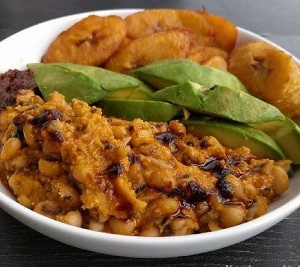As herbal doctor Asonaba Owusu Aduomi from the Organic Foods and Wellness Centre, my commitment lies in fostering the complete well-being of individuals, with a special focus on those navigating the challenges of chronic conditions like diabetes. The wealth of nutritious and diverse foods within the Ghanaian culinary landscape offers a plethora of advantages for those aiming to regulate their blood sugar levels successfully.
In this exploration, we uncover the intrinsic value of Ghanaian foods that go beyond their cultural importance, serving as critical components in the dietary management of diabetes. These foods not only honor our culinary heritage but also play a vital role in supporting health and wellness for individuals with diabetes, showcasing the profound connection between traditional diets and modern health needs.
1. Brown Rice or Ofada Rice
The transition from white to brown or Ofada rice is a significant step towards diabetes management. The higher fiber content and lower glycemic index in brown rice aid in the gradual release of glucose into the bloodstream, maintaining stable blood sugar levels and preventing spikes. This staple, when incorporated into traditional dishes like jollof rice, not only enhances the meal's flavor but also its nutritional value, making it a beneficial choice for diabetics.
2. Beans
Beans, a cornerstone in many Ghanaian dishes, are a boon for diabetics due to their high fiber content. This fiber plays a crucial role in blood sugar management by slowing down the absorption of sugar, thus preventing sudden spikes in blood sugar levels. Paired with whole grains, beans provide a balanced meal with stable energy release, essential for blood sugar control.
3. Garden Eggs (African Eggplants)
Garden eggs, or African eggplants, are highly beneficial for diabetics because of their low carbohydrate and high fiber content. These characteristics contribute to feeling full without significantly affecting blood sugar levels. Their versatility in dishes, from raw consumption to stews, adds to their appeal as a diabetes-friendly food option.
4. Okra
Okra is beneficial for diabetes management primarily due to its high fiber content and low-calorie count. The unique soluble fiber found in okra can help regulate blood sugar levels by slowing down the digestion of carbohydrates. Its versatility in soups and stews also makes it a dietary staple that enhances meal texture while providing health benefits.
5. Millet
Millet, a nutrient-dense whole grain, is excellent for individuals with diabetes, leading to a slower increase in blood sugar levels post-consumption. Its use in porridge or as an ingredient in bread offers a nutritious alternative for breakfast or snacks, supporting stable blood sugar levels throughout the day.
6. Whole Grain Oats
Oats, with their rich beta-glucan fiber content, are effective in slowing down the absorption of glucose into the bloodstream, thereby regulating blood sugar levels. Preparing oats as porridge for breakfast, enhanced with nuts and fruits instead of sugar, provides a nutritious meal that supports blood sugar management.
7. Avocado
Avocado, rich in healthy fats and fiber, contributes to stabilizing blood sugar levels. The monounsaturated fats in avocados can improve insulin sensitivity, aiding in the regulation of blood sugar levels. Consumed alone, in salads, or as a spread on whole-grain bread, avocados add nutritional value and variety to a diabetic-friendly diet.
8. Soybeans
Soybeans are valued in the diabetic diet for their high protein content and low glycemic index, making them an excellent option for blood sugar regulation. Whether incorporated into stews, soups, or processed into tofu and soy milk, soybeans provide a versatile and nutritious addition to meals.
9. Fish
Fish, especially varieties high in omega-3 fatty acids like mackerel, sardines, and salmon, are beneficial for diabetics. These fatty acids help improve insulin sensitivity and reduce inflammation, supporting both blood sugar regulation and heart health.
10. Nkontomire (Taro Leaves)
Nkontomire, or taro leaves, offer a wealth of vitamins, minerals, and antioxidants with minimal impact on blood sugar levels. Incorporating nkontomire into stews or as a side dish can add nutritional diversity to meals, contributing to a balanced and health-supportive diet for individuals with diabetes.
11. Pumpkin Seeds
Pumpkin seeds, rich in magnesium, play a key role in blood sugar control. Roasted and lightly salted, they provide satisfying crunch and nutritional benefits, making them an ideal snack for managing diabetes and supporting overall metabolic health.
12. Plantain
Green, unripe plantains offer high fiber content and lower sugar levels, aiding in slow glucose absorption and maintaining stable blood sugar levels. The key with plantains is moderation and mindful preparation to ensure a healthy diet.
In conclusion, as Herbal Doctor Asonaba Owusu Aduomi, I advocate for integrating these Ghanaian foods into the diet of individuals managing diabetes. It's a testament to the power of natural, whole foods in supporting health and wellness. Through mindful selection and preparation of these foods, individuals with diabetes can enjoy the rich flavors of Ghanaian cuisine while effectively managing their condition.
Exciting news for everyone looking to harness the power of natural remedies in the fight against diabetes! I've just shared a link to my latest YouTube video where I, Herbal Doctor Asonaba Owusu Aduomi from the Organic Foods and Wellness Centre, dive deep into the extraordinary world of Ghanaian superfoods. These aren't just any foods; they're nature's answer to managing diabetes more effectively and healthily.
In the video, I explore a variety of natural superfoods found right here in Ghana, from the fiber-rich brown rice or Ofada rice to the antioxidant-packed garden eggs, and how they can transform your diabetes management journey. Each superfood is broken down in detail, covering not only its health benefits but also how to incorporate these nutritional powerhouses into your daily diet.
This isn't just about food; it's about a lifestyle change towards better health and well-being, utilizing the gifts of nature we often overlook. So, if you're ready to take a step towards a more natural approach to managing diabetes, click on the video link attached. Don't forget to like, share, and subscribe for more insights into natural health remedies that can make a real difference in your life. Your journey to wellness begins now!"
Opinions of Wednesday, 27 March 2024
Columnist: Asonaba Owusu Aduomi















